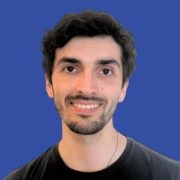
Cenni biografici
He obtained his Bachelor’s and Master’s degrees in Chemistry at the University of Trieste (2011-2017), the latter with a specialization in Inorganic and Physical Chemistry. The project of the two theses consisted in the simulation of vibrationally resolved NEXAFS spectra using DFT and TD-DFT methodologies, under the supervision of Prof. Giovanna Fronzoni and Prof. Mauro Stener.
Subsequently, he moved to Vienna, where he worked as a research assistant (PhD student) and worked on synthetic analogues of the “Water Oxidation Complex”, a natural complex involved in photosynthesis (2018-2019), under the supervision of Prof. Leticia González. Subsequently, he obtained his PhD in Theoretical Chemistry and Computational Modeling at the Autonomous University of Madrid (2019-2022), under the supervision of Prof. Juan José Nogueira. There, he had the opportunity to apply a series of computational methodologies to study the interactions between anticancer drugs and complex biological media such as DNA filaments and lipid layers, using methods based on molecular dynamics, quantum chemistry and hybrid approaches (QM/MM). The experience gained during the PhD allowed him to develop the software MoBioTools, to automatically generate inputs for QM/MM calculations with different quantum chemistry software.
Between 2022 and 2023 he worked as a postdoctoral researcher at the Aix-Marseille Université, under the supervision of Prof. Dr. Nicolas Ferré, where he was responsible for the maintenance and improvement of a software for the simulation of rhodopsin proteins, involved in human vision. Subsequently, he worked for a few months as a postdoctoral researcher in Madrid, where I was involved in a project aimed at developing machine learning potentials for complex molecular systems (Behler-Parrinello Neural Networks).
From March 2024 to May 2025 he worked as a Research Scientist at Qubit Pharmaceuticals, in Paris. In this context, he was involved in activities including Virtual Screening, Pharmacophore Search and Molecular Docking, Classical MD with polarizable force fields and Free Energy Perturbation calculations to calculate the binding free energy, within the whole Drug Discovery process for specific protein and RNA targets.
Attività Scientifica
Within the Molecular Informatics group, Gustavo is involved in the study of the chemical exposome and its effects on human health. He is currently involved in the creation of models to study the correlation between the chemical structure of xenobiotics and their effects at the cellular level. The models are based on inputs derived from molecular features such as classical descriptors, quantum mechanical descriptors, fingerprints and other biological data annotated in the literature. Within the Drug Discovery area, Gustavo is involved in the application of in silico methodologies for the design of NLRP3 inflammasome inhibitors and in the design of modulators of epigenetic regulators in oncology.
